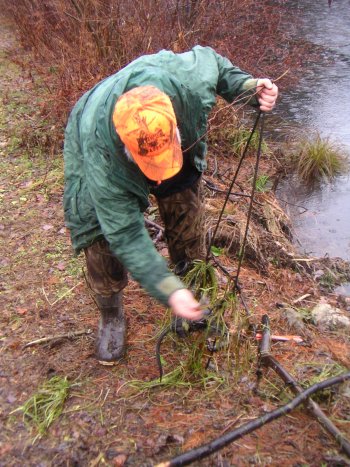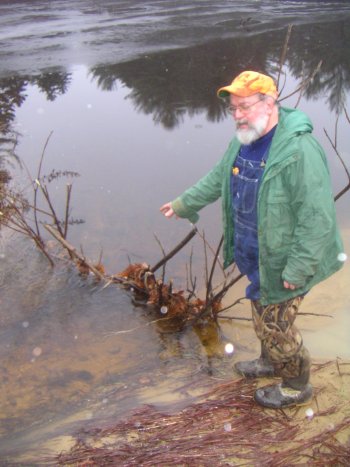New Hampshire Nature Notes
by Eric Orff
On the trap line with Mel.
Wednesday 11/30/2005
I accompanied Mel Listen, president of the NH Trappers Association, on his trap line today. I do not consider myself a trapper even though I have live trapped/caught nuisance wildlife from flying squirrels, skunks, raccoons, woodchucks, snakes, bats, red and gray squirrels to bears, deer and nearly 40 moose as a wildlife biologist for the Fish and Game Department and my own nuisance wildlife control business.
But trapping wild animals in the wild takes a whole spectrum of skills I'll never know. I have always know trappers to be extremely knowledgeable of wildlife and more in tune with nature than any other outdoor group I have known. Lots of people claim to be wildlife experts or nature students, but they just don't measure up to any average trapper.
Lets face it, when an animal can travel in a 360 degree direction in the wild you must be able to get it into your trap that only takes up a fraction of that 360 degree circle. Trappers can read the landscape like no others and can predict where an animal WILL travel.
Plus trappers don't just study their trapping areas like the most deer hunter only during the season, but in my experience trappers learn their turf year round. They must get land owner written permission and file a copy of the permit with the Fish and Game conservation officer who covers the town they are trapping in. So every trapper must know the people and contacts in each community they trap as well. From selectmen to conservation commission members and especially the road agents to the local police officers trappers learn the people as well as the wildlife in each town. They really become part of the fabric of each town they trap even when they live elsewhere.
That was so evident with my trip with Mel. Plus he had requested my presence to discuss significant changes in his wildlife observations this year. The least was the animals he was trapping. Actually he has noticed a dramatic decline in mice, squirrels, porcupines and other animals in his trapping area. Consequently he reduced his efforts at trapping animals that may be affected by the decline in prey. He cut way back his fox trap line and is not going to trap fisher this fall. He said mange has also taken a toll on the foxes in his area the last three years although they seem to be improving now. Trappers, like Mel, want wildlife to be abundant and available in the future so they actually are continually managing the wildlife in the areas they trap by being careful to just take the surplus provided by nature each year.
Trappers are the eyes a wildlife biologist like me need to understand possible changes in wildlife populations locally. Each New Hampshire trapper must also provide Fish and Game, in this case me since I am the furbearer biologist, with an annual report of their catch by town. Since 1983 I have also required them to tell me how many traps by species and for how long they were set. By calculating catch per 100 trap-nights over time I can actually get a sense of population changes. This is critical data needed to properly manage the furbearer populations.
Plus each trapper is asked to volunteer his observations on a separate form. Trappers are asked to give me a sense of abundance of things like acorns, raspberries, pine cones, mice, squirrels, bobcats and even disease prevalence in the towns they trap. Basically a list from soup to nuts of what is going on in the wild. Since trappers trap the same areas year after year they know what is going on from one year to the next. Trappers provide services to their communities and to wildlife far beyond what first meets the eye. Trappers ARE the state's eyes on the wild side.


